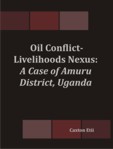Humanities

Business

Education

Social Sciences

Physical Science & Math

Life and Environmental

Library: Economics
Humanities

Business

Education

Social Sciences

Physical Science & Math

Life and Environmental

This dissertation will discuss the uncertainty encountered in the daily operations of businesses. The concepts will be developed by first giving an overview of probability and statistics as used in our everyday activities, such as the basic principles of probability, univariate and multivariate statistics, data clustering and mapping, as well as time sequence and spectral analysis. The examples used will be from the oil and gas exploration industry because the risks taken in this industry are normally quite large and are ideal for showing the application of the various techniques for minimizi...
The Committee on Financial System (CFS), popularly known as Narasimham Committee, was set up in 1991 to make recommendations for bringing about the necessary reforms in the financial sector. Narasimham Committee appraised and acknowledged the success and progress of Indian banks since the major banks were nationalized on 19 July 1969. Unfortunately, the developments were witnessed only in the field of expansion and spread of bank branches, generation of huge employment and mobilization of savings rather than also in improvement in efficiency. Besides, corruption, fraud, misutilization in publi...
The United States government spends billions of dollars on home ownership programs in low and moderate income communities. However, there is paucity of academic research to assess the socioeconomic impacts of these programs. The purpose of this empirical research was to assess their possible impacts. The key research question explored the relationship between low and moderate income home ownership, the independent variable, and the dependent variables of the rates of crime, unemployment, high school graduation, and standardized test scores in the communities concerned. The research...
The problem addressed in this dissertation research was the inability of the single-factor capital asset pricing model (CAPM) to identify relevant risk factors that investors consider in forming their return expectations for investing in individual stocks. Identifying the appropriate risk factors is important for investment decision making and is pertinent to the formation of stocks' prices in the stock market. Therefore, the purpose of this study was to examine theoretical and empirical validity of the CAPM and to develop and test a multifactor model to address and resolve the empirical short...
Immigrants are characterized on the average with higher human capital and are rewarded potentially less as compared to their native counterparts. This question has motivated me to analyze the immigrants-natives wage gap in detail and find the extent of this potential discrimination against the immigrants. I analyze the data from the first two quarters of the Quarterly Labour Force Survey, 2009 using the Oaxaca Decomposition technique. Applying both the threefold and twofold decomposition approaches, I computed the wage gap first using simple decomposition based on threefold and then the twofol...
Semi-strong form efficiency is generally supported by event studies, especially these on daily returns testing the market's reaction to accounting earnings. Nevertheless, the Post-Earnings-Announcement Drift (PEAD) anomaly, being inconsistent with semi-strong form efficiency, seems to have survived robustness tests through the years. This paper examines the reaction of ATHEX in response to fiscal year 2006 annual earnings announcements of 20 high capitalisation companies. The common event study methodology is being used in order to define expected returns and trace the abnormal performance of ...
Realism contends that conflict is intrinsically linked to natural resource endowment. This is the basis upon which the 'resource curse' theory is premised. Idealists on their part however view natural resource endowment as an avenue for economic growth and improved social and economic welfare of resource-rich communities. Their strong belief in the progressive potential of natural resources underpins the 'rentier state' theory. Soon after the discovery of a 'world class' oil deposit in Amuru district in northern Uganda, the 'black gold' discovery has quickly proved its unpleasant consequenc...
The book aims to quantify and analyze how two water scarce but ideologically different Middle Eastern political economies, Saudi Arabia and Syria, addressed water sector investment between 1980 and 2000. The study examines how narrow-coalitions of decision-makers obsessed by impossible-to-achieve food self-sufficiency goals, lacking environmental consideration and safe political processes contributed to massively waste scarce resources and unsustainable water policies. The book shows that of Saudi Arabia’s US$1,034 billion in oil revenues (1974-2001), 48% was spent on security, plus 10% on th...
Coalitions of developing countries at the WTO typically have a short life and do not produce results. Nonetheless, a specific coalition of developing countries named the G-20 seems to have a different destiny. Even though it focuses on agriculture, which is certainly the most difficult sector in which one can obtain concessions from developed countries, the G-20 has been able not only to survive but also to solidify its influence. This paper examines the consequences of G-20 actions. Moreover, it considers three separate questions. First, how has the G-20 been able to maintain its unity despit...
In economic experiments decisions often differ from game-theoretic predictions. Why are people generous in one-shot ultimatum games with strangers? Is there a benefit to generosity toward strangers? Research on the neural substrates of decisions suggests that some choices are hormone-dependent. By artificially stimulating subjects with neuroactive hormones, we can identify which hormones and brain regions participate in decision-making, to what degree and in what direction. Can a hormone make a person generous while another stingy? In this paper, two laboratory experiments are described using ...









